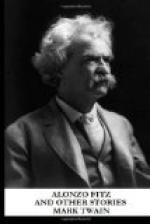“Yes, that is true; but a nation’s language is a very large matter. It is not simply a manner of speech obtaining among the educated handful; the manner obtaining among the vast uneducated multitude must be considered also. Your uneducated masses speak English, you will not deny that; our uneducated masses speak American it won’t be fair for you to deny that, for you can see, yourself, that when your stable-boy says, ’It isn’t the ’unting that ’urts the ’orse, but the ’ammer, ’ammer, ’ammer on the ’ard ‘ighway,’ and our stable-boy makes the same remark without suffocating a single h, these two people are manifestly talking two different languages. But if the signs are to be trusted, even your educated classes used to drop the ‘h.’ They say humble, now, and heroic, and historic etc., but I judge that they used to drop those h’s because your writers still keep up the fashion of patting an before those words instead of a. This is what Mr. Darwin might call a ‘rudimentary’ sign that as an was justifiable once, and useful when your educated classes used to say ’umble, and ’eroic, and ’istorical. Correct writers of the American language do not put an before three words.”
The English gentleman had something to say upon this matter, but never mind what he said—I’m not arguing his case. I have him at a disadvantage, now. I proceeded:
“In England you encourage an orator by exclaiming, ’H’yaah! ‘yaah!’ We pronounce it heer in some sections, ‘h’yer’ in others, and so on; but our whites do not say ‘h’yaah,’ pronouncing the a’s like the a in ah. I have heard English ladies say ’don’t you’—making two separate and distinct words of it; your Mr. Burnand has satirized it. But we always say ‘dontchu.’ This is much better. Your ladies say, ’Oh, it’s oful nice!’ Ours say, ‘Oh, it’s awful nice!’ We say, ‘Four hundred,’ you say ’For’—as in the word or. Your clergymen speak of ‘the Lawd,’ ours of ‘the Lord’; yours speak of ‘the gawds of the heathen,’ ours of ’the gods of the heathen.’ When you are exhausted, you say you are ‘knocked up.’ We don’t. When you say you will do a thing ‘directly,’ you mean ‘immediately’; in the American language—generally speaking—the word signifies ‘after a little.’ When you say ‘clever,’ you mean ‘capable’; with us the word used to mean ‘accommodating,’ but I don’t know what it means now. Your word ‘stout’ means ‘fleshy’; our word ‘stout’ usually means ‘strong.’ Your words ‘gentleman’ and ‘lady’ have a very restricted meaning; with us they include the barmaid, butcher, burglar, harlot, and horse-thief. You say, ‘I haven’t got any stockings on,’ ’I haven’t got any memory,’ ’I haven’t got any money in my purse; we usually say, ’I haven’t any stockings on,’ ‘I haven’t any memory!’ ’I haven’t any money in my purse.’ You say ‘out of window’; we always put in a the. If one asks ‘How old is that man?’ the Briton answers, ‘He will be about forty’; in the American language we should say, ‘He is about forty.’ However, I won’t tire you, sir; but if I wanted to, I could pile up differences here until I not only convinced you that English and American are separate languages, but that when I speak my native tongue in its utmost purity an Englishman can’t understand me at all.”




